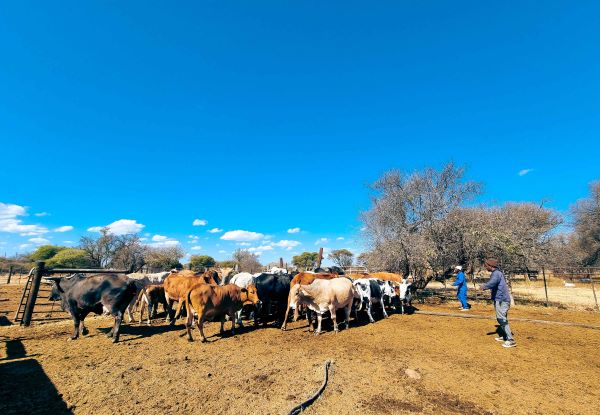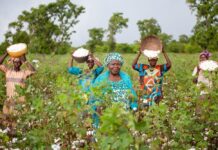Land Reform – Despite socio economic challenges faced by South Africans in general, the agriculture and tourism sector can significantly contribute to mitigating and curbing escalating youth unemployment especially in rural areas. So says the Vumelana Advisory Fund, a non-profit organisation that helps beneficiaries of the land reform programme to make their land profitable.
Young people continue to be vulnerable in the labour market. According to the Stats SA Quarterly Labour Force Survey (QLFS) for the first quarter of 2023, a total of 4.9 million young people were unemployed during the period under review, resulting in an increase of 1.1% to 46.5% compared with the previous quarter.
As the country continues to celebrate Youth Month, the spotlight remains on the challenges faced by young people, with unemployment being a primary concern.
The Barokologadi Communal Property Association (CPA) in the North West Province serves as a compelling case study, demonstrating how land reform can generate crucial employment opportunities and empower young people with valuable skills to ensure that they participate in the economy.
With the support of the Vumelana Advisory Fund, the Barokologadi CPA has successfully created approximately 200 temporary employment opportunities in the Melorane ERP Game Reserve. Notably, 70% of the beneficiaries are young people. There are 29 full time employees within both tourism and agriculture projects.
Through its innovative Community Private Partnership (CPP) model, Vumelana successfully facilitated the partnership between the claimant communities from Barokologadi CPA and its private sector investors Elephants, Rhinos & People (ERP). CPP contracts are structured to ensure that the partners are able to meet their obligations and exercise their rights in a manner that supports the profitable operation of the business venture they enter into as it relates to the land. Vumelana’s role is to ensure that these partnerships are fair, profitable and most importantly of mutual benefit to both the CPA and the investor. In a CPP contract the communities typically bring their land and labour and the private partner brings capital and skills to the partnership. Private partners can also be influential in creating access to markets.
Barokologadi General Manager Amos Setou says, “The primary objective of the CPA is to manage the restored land and amongst others, foster the creation of employment opportunities within the community to improve the livelihoods of beneficiaries.”
Setou emphasises that poverty alleviation is a crucial aspect of the Barokologadi vision, along with a strong commitment to income generation and economic upliftment for their people.
He shares that the Barokologadi CPA has been able to leverage the partnership with ERP to drive other community development projects.
“In addition to the creation of formal employment opportunities, the partnership with ERP has yielded other positive spin-offs for the local community,” says Setou.
The CPA together with ERP has generously donated 300 bicycles to students in the community, enabling them to commute to school conveniently and with ease.
In addition, ERP and the Barokologadi CPA have taken the initiative to implement an entrepreneurship development programme specifically for its youth members. Notably, the CPA has supported 13 young people in establishing a cooperative for a beekeeping project. Since its inception in 2021, these 13 young people have successfully managed and operated the beekeeping project.
Furthermore, the CPA has established a study programme aimed at enhancing academic achievements in mathematics and science for high school students in the community, where they provide tools to enable better engagement within the STEM (Science, Technology, Engineering and Mathematics) subjects.
The Barokologadi CPA, together with ERP, has also established a Skills Development Center in Pitsedisulejang one of the nearby villages. In August 2021, they initiated a learnership programme called “End User Computing,” and enrolled 30 young people, who subsequently graduated from the programme in September 2022.
Currently, 50 young people are enrolled in the programme, and each participant receives a monthly stipend of R3,500. This financial support not only benefits the learners themselves but also provides daily assistance to their households.
Setou says, “The land reform programme requires young people to take advantage of the opportunities that come with land ownership. We need to promote and highlight the importance of land ownership to young people and emphasise how land reform can be used as a catalyst that can drive socio-economic development.”
With unemployment posing a major problem for young people, the CPA is resolute in its commitment to implementing impactful programmes to promote youth employment by leveraging its restituted land.
Tebogo Matshane, the current secretary of the Barokologadi CPA youth committee, who is also employed by the investor ERP, concurs. “Restituted land brings benefits not only to the beneficiary households but also to the entire community. Where land reform has been successfully implemented, it can play an important role in significantly turning around communities. Without a doubt, it has a significant role to play in South Africa.”
He acknowledges that not all CPAs are run as effectively as the Barokologadi, where young people are involved in the day-to-day running of the CPA sub-committees, and there is a need to get more young people across the country involved with CPAs. “We have seen how this partnership with ERP has been instrumental in creating opportunities for youth in our community.”
The Barokologadi CPA is in the process of expanding its agriculture and ecotourism projects, currently sourcing investors and operators who will collaborate with them in implementing projects. These will further its strategic imperatives to create job opportunities and enable expanded participation in the economy.








